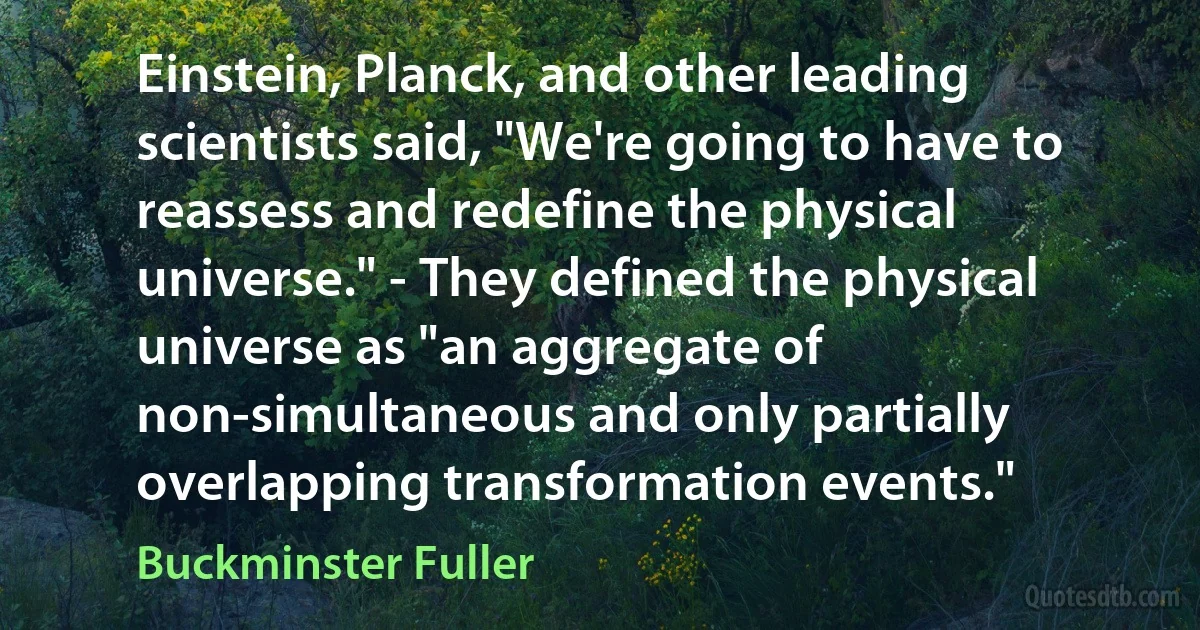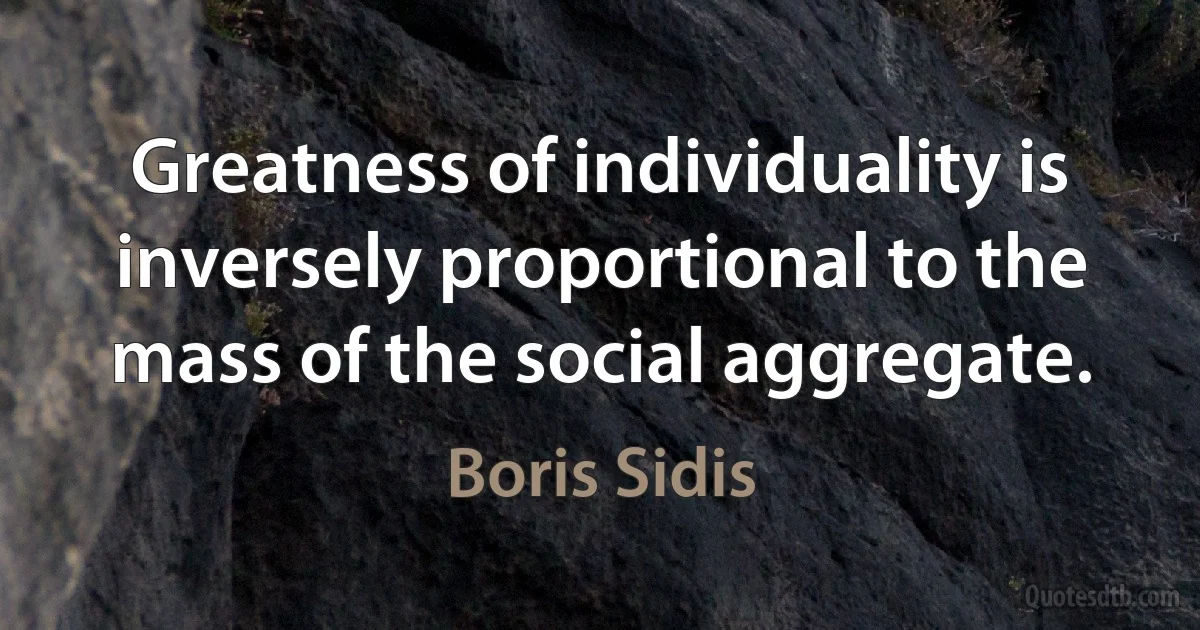Aggregate Quotes - page 4
It cannot but happen that those individuals whose functions are most out of equilibrium with the modified aggregate of external forces, will be those to die; and that those will survive whose functions happen to be most nearly in equilibrium with the modified aggregate of external forces.
But this survival of the fittest, implies multiplication of the fittest.

Herbert Spencer
Contemporary theories of politics tend to portray politics as a reflection of society, political phenomena as the aggregate consequences of individual behavior, action as the result of choices based on calculated self-interest, history as efficient in reaching unique and appropriate outcomes, and decision making and the allocation of resources as the central foci of political life. Some recent theoretical thought in political science, however, blends elements of these theoretical styles into an older concern with institutions. This new institutionalism emphasizes the relative autonomy of political institutions, possibilities for inefficiency in history, and the importance of symbolic action to an understanding of politics. Such ideas have a reasonable empirical basis, but they are not characterized by powerful theoretical forms. Some directions for theoretical research may, however, be identified in institutionalist conceptions of political order.

James G. March
The Second World War supplied the occasion for the spending, and Keynesian economics supplied the rationale. But Keynesian fiscal policy had political appeal even before the war demonstrated its economic success. For unlike the various proposals for structural reform, such as vigorous antitrust action or national economic planning, Keynesian economics offered a way for the government to control the economy without having to choose among controversial views of the good society. Where earlier reformers had sought economic arrangements that would cultivate, citizens of a certain kind, Keynesians undertook no formative mission; they proposed simply to accept existing consumer preferences and to regulate the economy by manipulating aggregate demand.

Michael J. Sandel
Similar though Marx and Thoreau may be in their accounts of the consequences of living in a society defined by money, their suggestions for how to respond to it are poles apart. Forget the Party. Forget the revolution. Forget the general strike. Forget the proletariat as an abstract class of human interest. Thoreau's revolution begins not with discovering comrades to be yoked together in solidarity but with the embrace of solitude. For Thoreau, Marx's first and fatal error was the creation of the aggregate identity of the proletariat. Error was substituted for error. The anonymity and futility of the worker were replaced by the anonymity and futility of the revolutionary. A revolution conducted by people who have only a group identity can only replace one monolith of power with another, one misery with another, perpetuating the cycle of domination and oppression. In solitude, the individual becomes most human, which is to say most spiritual.

Curtis White
Propensities for crime are irrelevant in a discussion about the murder of an individual - Ms. Kathryn Steinle and all other victims of criminals who should not be in the U. S. For these deaths have nothing to do with aggregate crime rates; they're about individuals who should be alive: a baby that should have been born, a girl who should be among the living, young men and women who should not be dead. To justify the crime-probabilities line-of-inquiry in the context of killer Francisco Sanchez' presence that day on the San Francisco pier, you would need to show that had Sanchez been deported or jailed or turned back at the border-his victim, Ms. Steinle, would nevertheless have suffered the same fate at the hands of a native murderer. The same eventuality would need to be demonstrated with respect to each individual victim of a criminal alien. The implication is crushingly stupid.

Ilana Mercer
Donald Trump's political rivals look at the price exacted by a Muslim like Syed Farouk and his bride in the aggregate. To a politician, 14 lives in 322 million is a small price to pay for 'our freedoms.' Fourteen dead in San Bernardino is not a steep price to pay for unfettered immigration from Islamic countries, peddled politically as 'our values,' 'our tolerance,' 'our greatness.' This callous calculus is second nature to neoconservative politicians like Lindsey Graham or Darth Vader Cheney. Not to Trump.

Ilana Mercer
On "shithole countries": "What makes a country, the place or the people? Does the country create the man or does the man make the country? The answer is no chicken-or-egg quandary. Human action is the ultimate adjudicator of a human being's worth. The aggregate action of many human beings acting in concert is what makes or breaks a society. In other words, it is the individual who creates the collective, not the other way around. The Man makes the country what it is."

Ilana Mercer
The concrete shell of this stove would surely crack if its strength were not reinforced with steel rod, wire fabric, or barbed wire. The latter is our choice. We laid continuous strands of barbed wire between the rows of slip form masonry. The thermal expansion rate of concrete is the same as steel up to a temperature comparable to boiling water... Beyond that, steel expands at a faster rate than concrete. At a temperature of about 500 degrees F., the bond between the concrete and steel is destroyed... The type of aggregate in the mix is primarily responsible for this kind of failure.

Ken Kern
Arrow's Impossibility Theorem is quite surprising. It shows that three very plausible and desirable features of a social decision mechanism are inconsistent with democracy: there is no "perfect” way to make social decisions. There is no perfect way to "aggregate” individual preferences to make one social preference. If we want to find a way to aggregate individual preferences to form social preferences, we will have to give up one of the properties of a social decision mechanism described in Arrow's theorem.

Hal Varian
I leave undecided the question whether complete mutual freedom of international commerce, such as is contemplated by the theory of Free Trade, would not serve the interests of Germany. But as long as most of the countries with which our trade is carried on surround themselves with customs barriers...it does not seem to me justifiable, or to the economic interest of the nation, that we should allow ourselves to be restricted in the satisfaction of our financial wants by the apprehension that German products will thereby be slightly preferred to foreign ones. ... The minority of the population, which does not produce at all, but exclusively consumes, will apparently be injured by a customs system favouring the entire national production. Yet if by means of such a system the aggregate sum of the values produced in the country increase, and thus the national wealth be on the whole enhanced, the non-producing parts of the population...will eventually be benefited.

Otto von Bismarck
A social aggregate which has chosen the fatal path of organic evolution must succumb to the same law of organic development to which all organisms are subject, namely greater and greater organization, increase of structure, greater differentiation, decrease of critical, personal, consciousness, loss of individual liberty, increased activity of the subconscious forces, falling into a state of somnambulism which can only be redeemed by revolution or by death.

Boris Sidis
An intellectual ... lives for ideas-which means that he has a sense of dedication to the life of the mind which is very much like a religious commitment. This is not surprising, for in a very important way the role of the intellectual is inherited from the office of the cleric: it implies a special sense of the ultimate value in existence of the act of comprehension. Socrates, when he said that the unexamined life is not worth living, struck the essence of it. We can hear the voices of various intellectuals in history repeating their awareness of this feeling, in accents suitable to time, place and culture. "The proper function of the human race, taken in the aggregate,” wrote Dante in De Monarchia, "is to actualize continually the entire capacity possible to the intellect, primarily in speculation, then through its extension and for its sake, secondarily in action.”.

Richard Hofstadter
We are in an age that assumes the narrowing trends of specialization to be logical, natural, and desirable. Consequently, society expects all earnestly responsible communication to be crisply brief. . . . In the meantime, humanity has been deprived of comprehensive understanding. Specialization has bred feelings of isolation, futility, and confusion in individuals. It has also resulted in the individual's leaving responsibility for thinking and social action to others. Specialization breeds biases that ultimately aggregate as international and ideological discord, which, in turn, leads to war.

Buckminster Fuller

![[If] our actions have even the slightest effect on the probability of eventual colonization, this will outweigh their effect on when colonization takes place. For standard utilitarians, priority number one, two, three and four should consequently be to reduce existential risk. The utilitarian imperative "Maximize expected aggregate utility!”. (Nick Bostrom)](https://cdn.quotesdtb.com/img/quotes_images_webp/49/nick-bostrom-aggregate-colonization-508049.webp)

